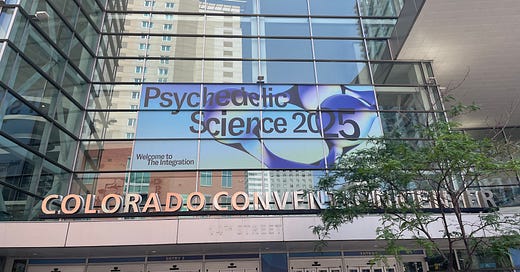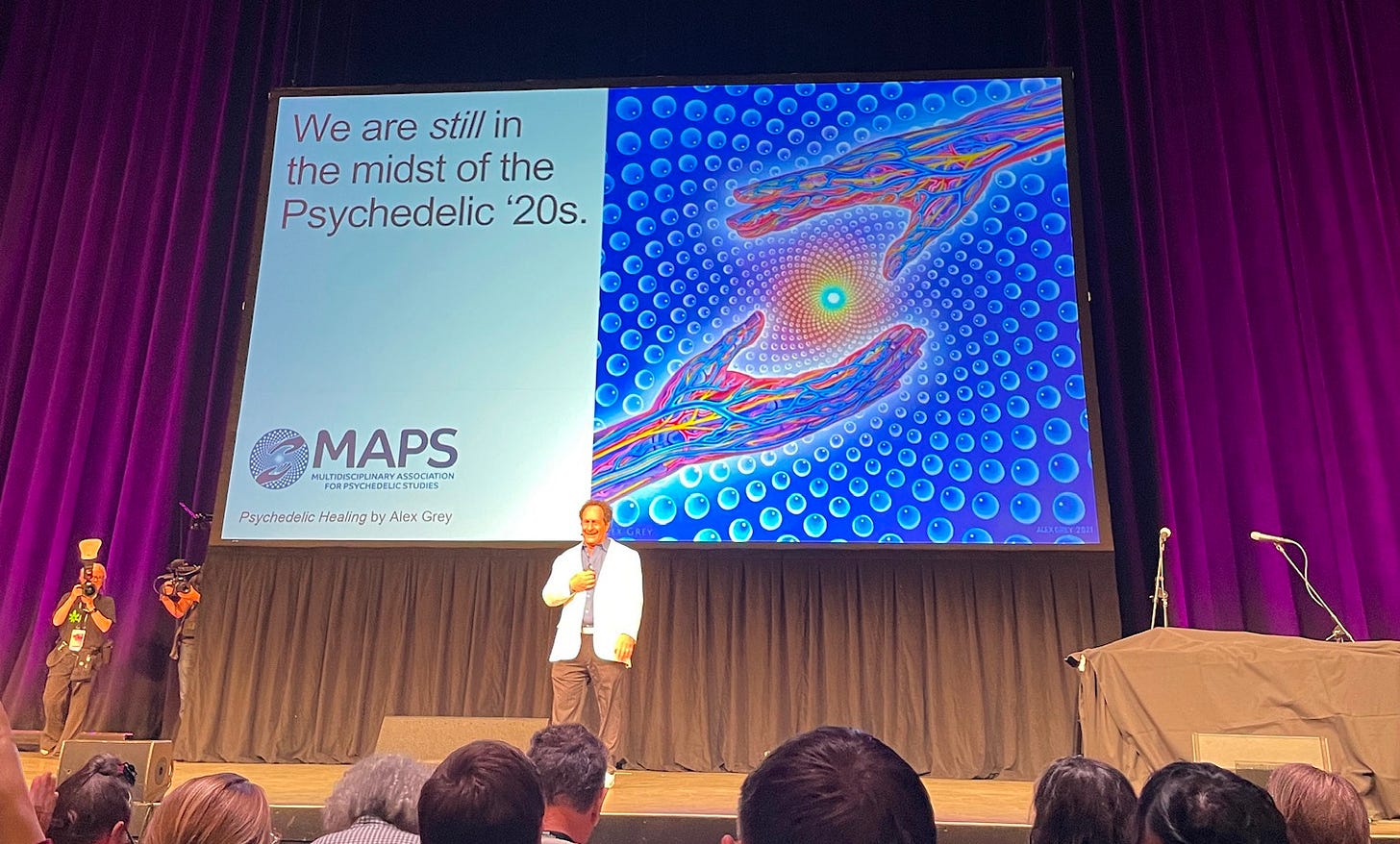Welcome back to The Microdose, an independent journalism newsletter brought to you by the U.C. Berkeley Center for the Science of Psychedelics.
This week, we’ll be reporting from the Psychedelic Science 2025 conference in Denver, Colorado.
This is the fifth time MAPS, the country’s best-known psychedelics research and advocacy organization, has held a Psychedelic Science conference. This year’s theme is “The Integration,” which, as the organization puts it on its website for the event, is an invitation for “our community to collectively integrate our journey thus far…and enter the next phase together.”
And boy is there a lot to integrate. The field has shifted and contracted since the last Psychedelic Science meeting in 2023, which was also held in Denver. In 2023, excitement about psychedelics had reached a fever pitch, and MAPS’ for-profit arm Lykos was just months away from submitting an application to the U.S. Food and Drug Administration to use MDMA-assisted therapy as a treatment for PTSD. Many people seemed all but sure the FDA would approve MDMA. That conference felt like a victory lap for MAPS; Founder Rick Doblin delivered his plenary speech in a slick white suit, saying that the FDA’s approval of MDMA would lay the groundwork for “net-zero trauma” globally by 2070. The theme of that year’s conference was “Be part of the breakthrough.”
But that breakthrough never happened and the psychedelics field has since seen its share of disappointments. Last summer, Lykos’s MDMA application was not accepted by the FDA, and after that, both MAPS and Lykos laid off significant portions of their staff. Several start-up psychedelic companies have been acquired, shuttered, or declared bankruptcy, including Field Trip, Journey Colab, Clairvoyant, and Numinus. Last fall, Massachusetts seemed poised to become the third state to pass a ballot initiative creating a state-regulated psilocybin program, but the measure failed to get the necessary votes.
This morning in Denver, Doblin addressed those pitfalls head-on. He came out on stage for the conference’s opening plenary session in what appeared to be the same white suit coat he wore for his keynote in 2023 coupled with a blue dress shirt and black slacks. “Last time I was wearing all white, but this time I’ve added black and blue,” Doblin said. “We are battered but we are still standing.”
But Doblin being Doblin, the speech quickly turned to a slew of victories for the psychedelic field. For one, returning to Denver feels fitting, as Colorado is the second state in the country with an operational state-regulated psilocybin programs. Just two weeks ago, the state’s natural medicine program dosed its first client. New Mexico will soon be home to the nation’s third state-regulated psilocybin program, and Texas just invested $50 million into research on ibogaine. That investment reflects not only a commitment to clinical trials, but also a higher profile for the substance; at this time last year, ibogaine was one of the more obscure psychedelics, with just 12% of respondents to a nationwide poll familiar with it.
Doblin was one of about a dozen presenters during the plenary, others included Palestinian singer Rawan Roshni, Colorado Attorney General Phil Weiser, Indigenous Peyote Conservation Initiative director Steve Benally, and MAPS interim co-directors Ismail Ali and Betty Aldworth. “MAPS and our entire movement are in a moment of transition,” Aldworth said, going on to acknowledge the tension between different approaches to broader psychedelic access. Ali gave some examples: “Are we talking about medicines, or about drugs? Are we talking about tradition or treatments? Or are we trying to weave something in between?”
Perhaps answers to those questions will emerge over the next couple days during over 400 scheduled events, which includes a range of themes, such as business, therapy, veterans, Black liberation, policy, and even a “Doblin” track.
Enjoying our coverage of Psychedelic Science? Subscribe! (It’s free!)
In addition to hundreds of sessions, the conference boasts an active afterparty scene: in the days before the conference started, people traded hundreds of messages in WhatsApp groups advertising their intravenous ketamine sessions, and DJ sets. But at the same time, several attendees have remarked to me that the conference seemed smaller and more subdued than the previous one. The crowd is noticeably smaller. During the 2023 plenary, the Denver Convention Center’s 5000-person capacity theater was completely full and people stood in the aisles. This year, there were plenty of free seats. A MAPS media representative estimated that attendance this year will fall between 8,000 and 10,000. (According to MAPS, the official 2023 attendance was around 12,000.)
But those attendees are still bringing plenty of personality. The last time I saw so many fedoras was in 2023 at the last Psychedelic Science conference. I saw not one but two people wearing Hieronymous Bosch prints. The crowd is marked by plenty of mushroom hats, manbuns, tie-dye, trippy patterns, including, of course, Grateful Dead’s dancing bears. One attendee was even accompanied by a poodle dyed pink and blue.
The Microdose is here on the ground in Denver and will publish another dispatch with closing thoughts on Friday.
At the conference? Join The Microdose editor Malia Wollan, journalists and former UC Berkeley - Ferriss Psychedelic Journalism Fellows Tiney Ricciardi and Mattha Busby, and me for a panel discussion about psychedelic journalism on Friday at 11:30am.









